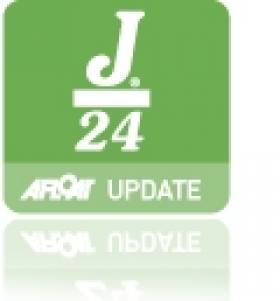Displaying items by tag: northern championships
Sharkbait Takes Another Bite at Royal Ulster.
Howth's Ben Duncan sailing Sharbait has etched another victory in the SB3 class following a weekend of very up and down conditions with some sizeable shifts and changes in pressure at the SB3 Northern Championships at Royal Ulster Yacht Club.
But the PRO team were well able and a full schedule of racing was completed on the Lough. Three of the top four Irish boats from the Worlds took three of the top four spots and had pace on pretty much every one, a further indication that going to Torbay has definitely given these boats a lift.
The Vaughan brothers continued their upward trajectory with a very solid second place. Andrew Ageo had a win in race 2 and pretty steady results to finish third. Dave Cheyne had an up and down regatta. The local sailors was very fast in patches but got buried a couple too many times to challenge.
Sharbait was lucky enough to not have to make too much of the conditions and sailed the fleet to produce another overall win.
Highlights of the weekend for the winners were winning the first race by 2:30 minutes and getting caught up in a match racine with Dave Cheyne for race 3. Cheyne pipped the Howth boat on the line by about a foot.
The next event in the SB3 calendar is the national champs in four weeks time. Flipper and Mel Collins are expected to be back in the fleet along with plenty of further competition.
1st Sharkbait
2nd Toucan 3
3rd Flutter
4th Team Cheyne

Royal Ulster presents Sharkbait their winning prize. Photos: Ken Hunter
O'Driscoll Domination of J24 Fleet Continues
The stranglehold that Flor O'Driscoll and his crew on 'Hard on Port' from the Royal St.George Yacht Club seem to have on the Irish J/24 Class was maintained with yet another win, this time the Northern Championships hosted by Lough Erne Yacht Club on August 7th/8th, writes Graham Smith.
After a slow start, with a 4th and 6th in the first two races, the Dun Laoghaire boat showed her transom to the other 11 boats in the fleet over the remaining four races in varied wind conditions. The result was an emphatic win by ten points from the runner-up, J.P.McCaldin of the host club sailing 'Jamais Encore'.
Class President Robin Eagleson sailed so consistently on his veteran 'Luder Too' that he tied on points with 'Jamais Encore' and only lost out on a countback, an impressive result considering a 30-year gap in the boats' ages. Third overall and winning the Silver Fleet award for the older J/24s was just reward for an outstanding series.
Current National Champion Mickey McCaldin ('Murder Picture') was consistently in the top six but never really got going and had to settle for 4th overall while the same could be said of Brian McDowell's 'Scandal' from Malahide in 5th place. 'Javlin' (Stan Bradbury from Lough Ree YC) started the event with a bang, recording a 1st and 2nd in the opening races, but two OCSs later on put paid to their chances.
Having already won the Western Championships at Lough Ree in mid-June and an impressive 2nd overall in Class 3 at the ICRA Nationals on Dublin Bay, Flor O'Driscoll and his crew are looking the outstanding favourites to add the national title to their year's tally.
The 2-day event takes place on September 11th/12th at Howth Yacht Club, venue for the J/24 European Championships next year. It will provide J/24 sailors, especially those from the inland lake clubs, to familiarise themselves with the tidal Howth waters before the big event in 2011.





























































